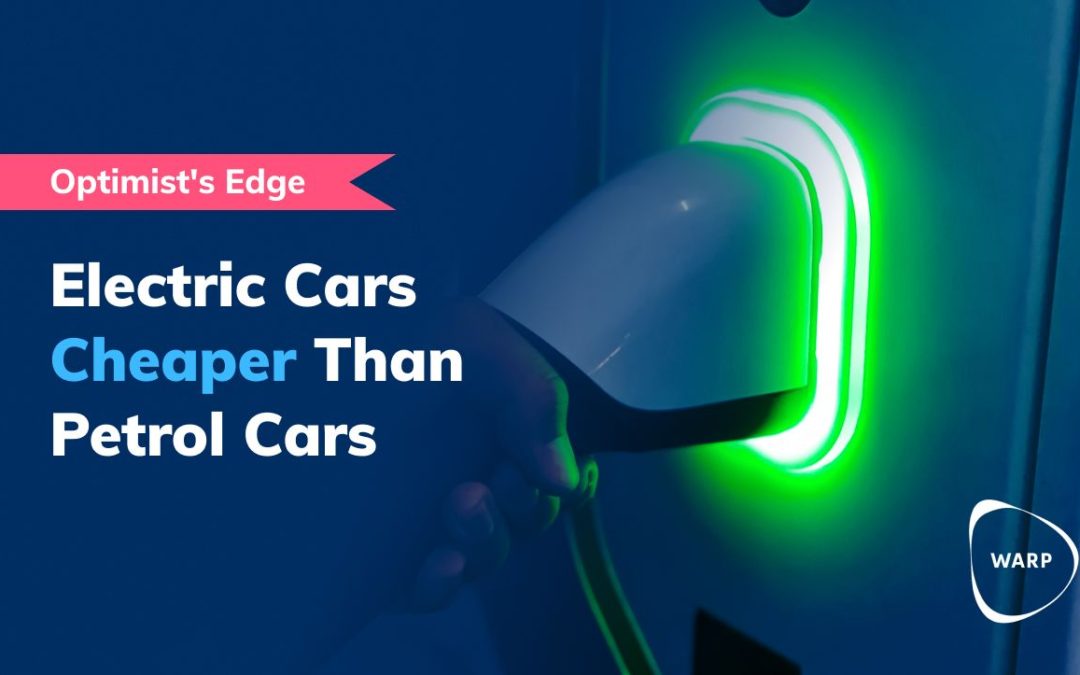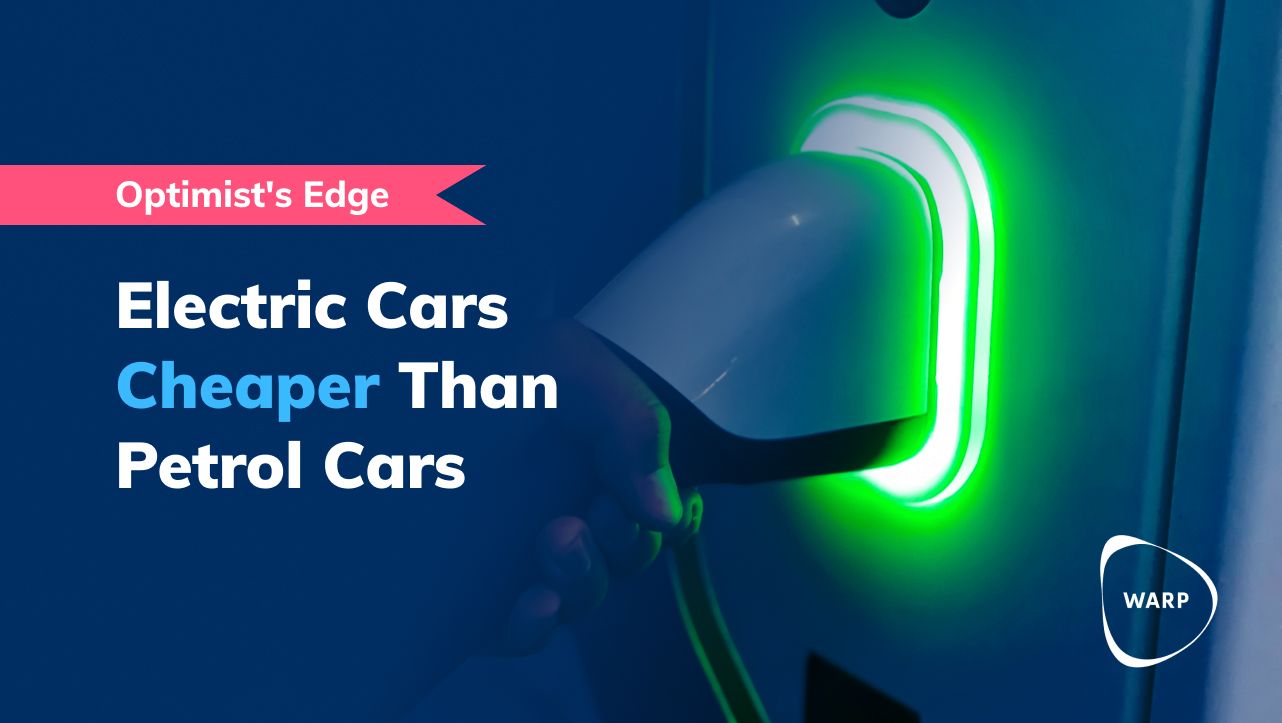
We are building a library of optimistic edges, exclusive for our Premium Supporters.
What people believe about the future is mostly wrong. We show the facts and give you an edge.
This Optimist’s Edge article is open for everyone as an example.
👉 Read more about Premium Supporter
- Free Trial first month – after that $10 per month
- No commitment, no catch, cancel anytime
Summary
📉 What people are wrong about
36 percent of the respondents in our survey believe that electric vehicles (EVs) never will be cheaper than gasoline cars and 29 percent believe EVs never will outsell gas cars. 25 percent assume it will happen sometime after 2040 or 2050.
On lithium-ion batteries, 86 percent don’t know how much costs have dropped in the last ten years.
A majority are wrong about the projected price decrease the coming decade.
📈 Here are the facts
Electric cars so far have been more expensive than petrol cars because of the battery cost. But the cost of batteries is declining rapidly, dropping 85 percent between 2010 and 2020.
The decline will continue in the coming ten years. Forecasts show a decrease in price of 60-90 percent in 2030.
💡 Optimist’s Edge
The declining battery costs will make electric cars cheaper to buy 2025.
During the second half of this decade, we will probably see a massive shift to electric cars.
But better and cheaper batteries also enable many other types of electric vehicles, such as larger and stronger drones.
👇 How to get the Optimist’s Edge
You should consider replacing your gasoline car with an electric vehicle as soon as possible.
EVs are already cheaper to own and operate, so you’ll save money immediately.
But when the big shift away from gasoline cars happens the market will be flooded with them, and prices on used cars will decrease rapidly.
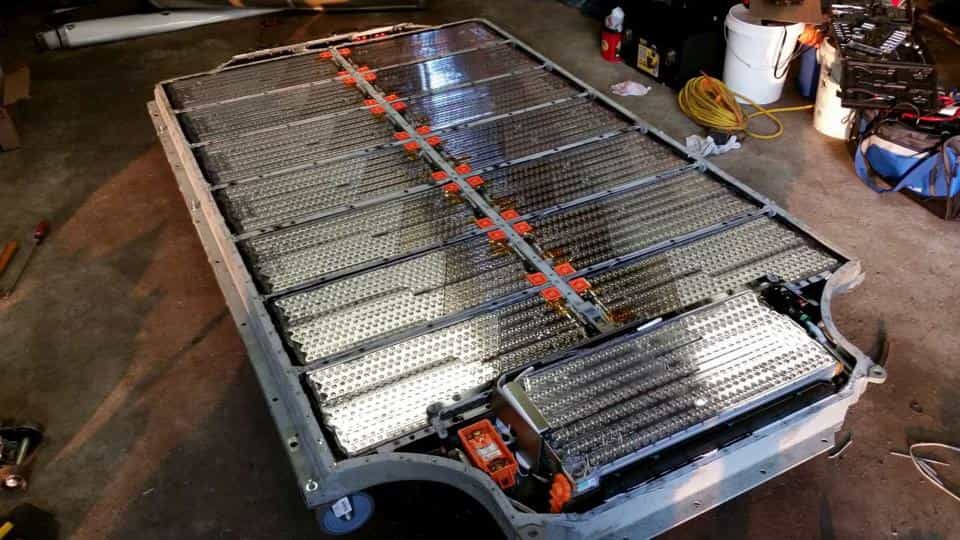
📉 What people believe about lithium-ion batteries and EVs
The main reason electric cars are more expensive to buy than cars with an internal combustion engine is the battery. But surprisingly, most people do not go around thinking about the relationship between the cost of lithium-ion batteries and electric vehicles.
Even if they were, they would probably draw the wrong conclusions because they don’t have the facts about what has happened, and will happen, to the cost of the batteries.
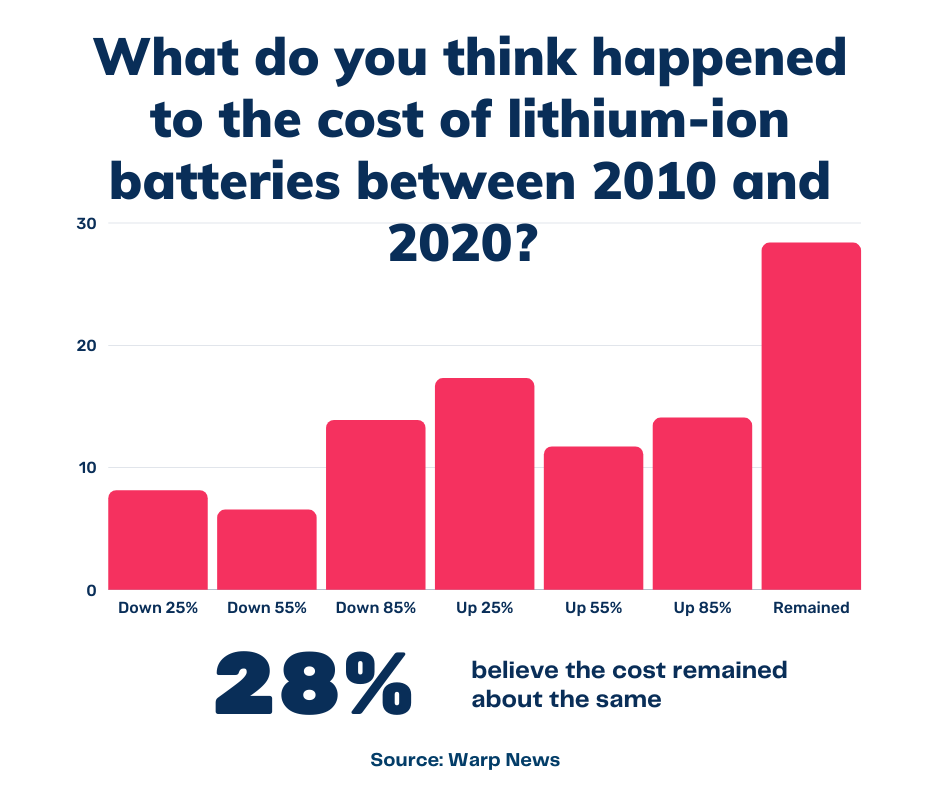
43 percent of the respondents think the costs have gone up, and 28 percent that they have remained about the same, which is of course very, very wrong.
Only 14 percent gives the right answer of an 85 percent drop.
Based on that, it’s no surprise that 33 percent think the cost will remain the same the coming decade and 36 percent think the cost will increase.
Only 31 percent think costs will go down.
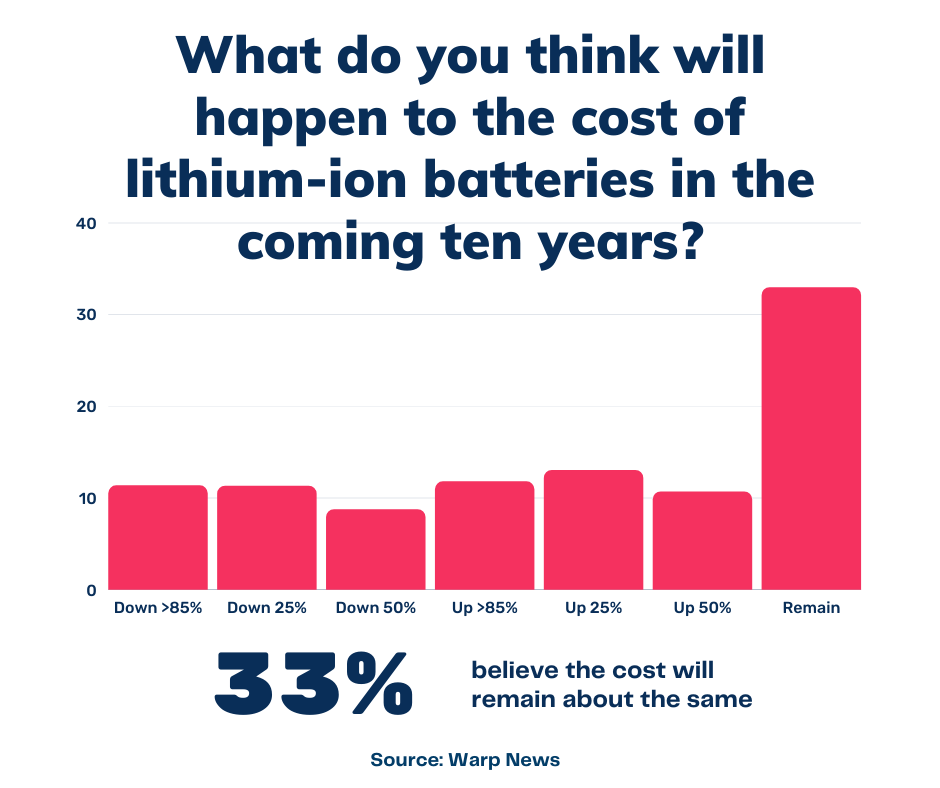
That is reflected in their thinking on electric cars. We asked when they think electric cars will be cheaper than gasoline cars.
By far the most common answer is that it will never happen, 36 percent.
Never is a very long time… and a fascinating answer when it is likely that it will actually happen within five years.
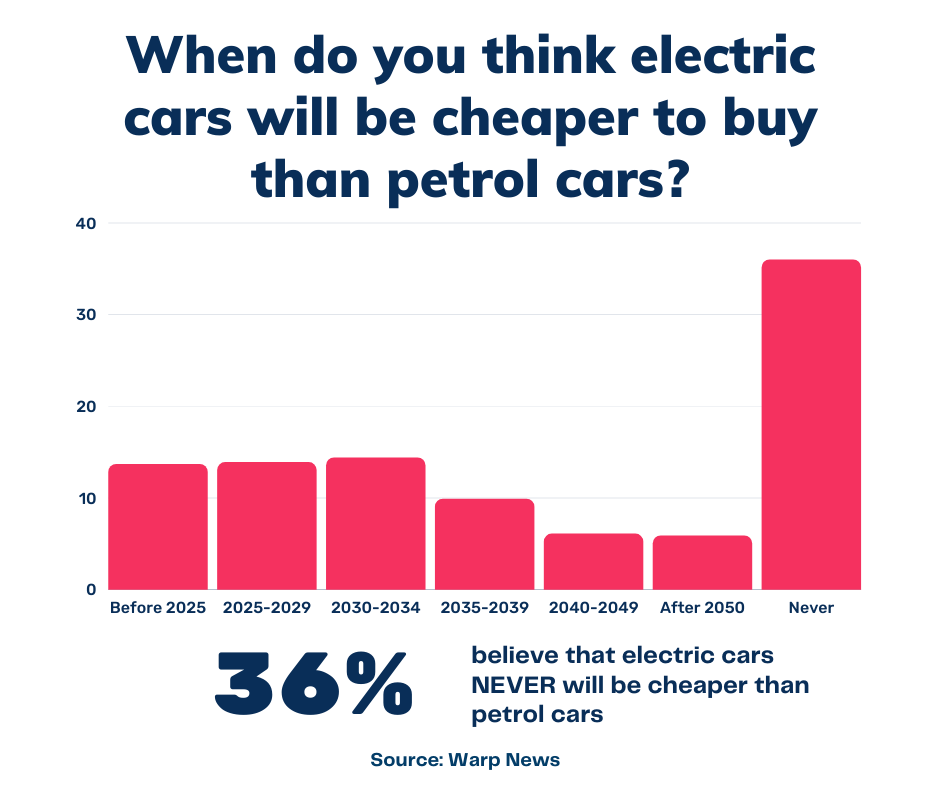
We also asked when electric cars will outsell gasoline cars.

Again the most common answer is never, 29 percent and the majority thinks it decades into the future.
📈 The facts about lithium-ion batteries and EVs
The lithium-ion battery is one of our great inventions, and its inventor, John B. Goodenough, was awarded the Nobel Prize for it. He doesn’t think it is good enough though. He is now 98 years old and working on a new kind of solid-state battery.
There are many things to say about batteries, but we are focusing on what we think is most important for you to know right – declining costs – and will get to many other aspects in future Optimist’s Edge articles.
Battery costs have dropped 85 percent since 2010
According to Wright’s Law, which has been proven many times throughout history, the cost of making a product decreases by a certain percentage for every accumulated doubling of production.
For each doubling of production, the associated cost drops by a certain percentage. If the cost of producing 1000 units is $100, then the cost of unit number 2000 will be $80. For unit number 4000, the cost will be $64, and for unit number 8000 it will be $51.
According to Bloomberg NEF, for lithium-ion batteries, the percentage drop per doubling is 18 percent. ARK Invest indicates 28 percent. A research paper from MDPI indicates 24 percent. Summed up, we have three reliable sources indicating about the same percentage drop per doubling.
Between 2010 and 2020 costs declined 85 percent.
Since lithium-ion batteries became commercially available in 1991, costs have dropped 97 percent according to MIT researchers.
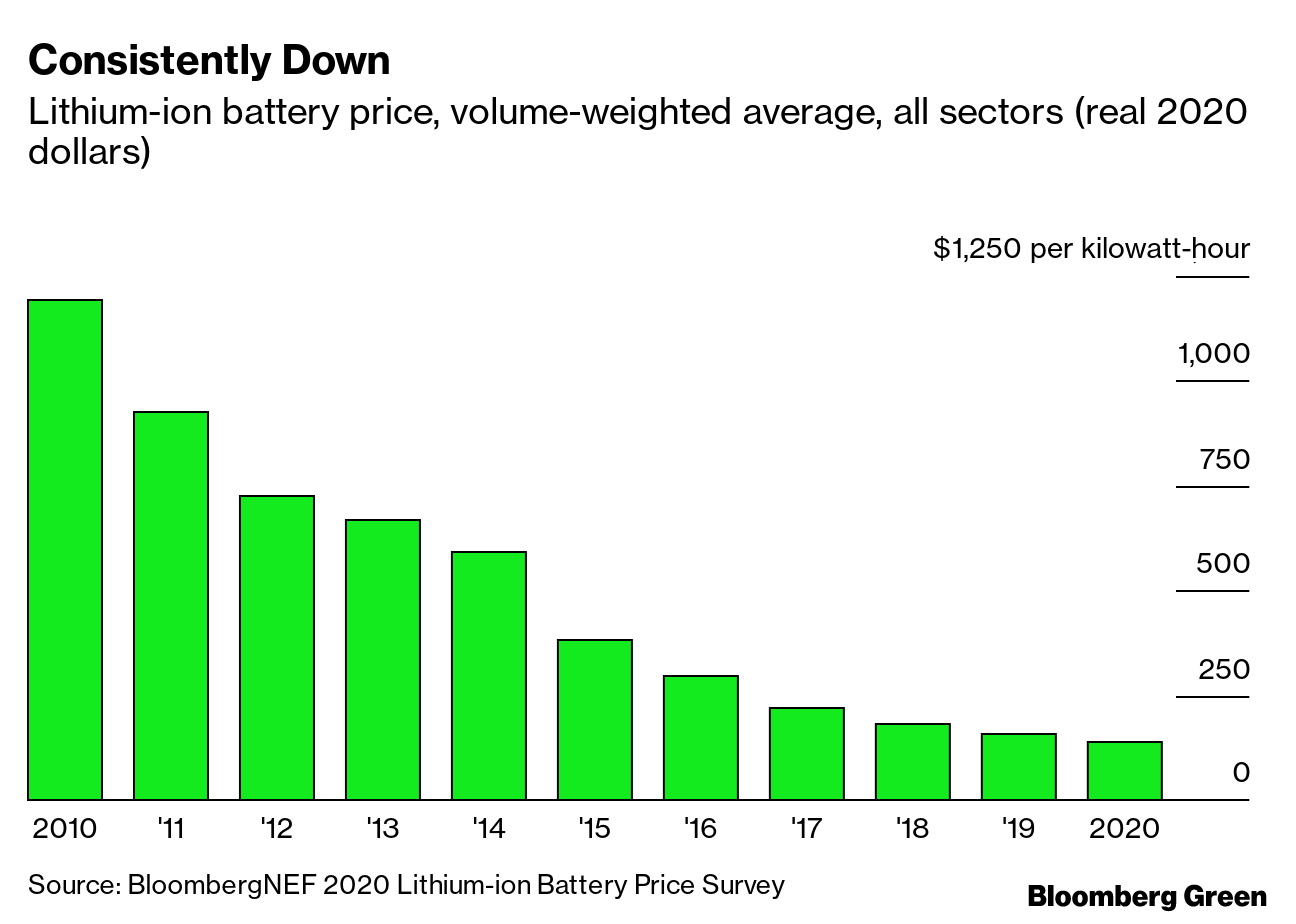
Battery costs will continue to decline
Bloomberg predicts that costs will drop 60 percent between 2019 and 2030, with demand going from 230 GWh to 2000 GWh in 2030. Tony Seba thinks 70 percent. Seba is the clean energy expert most right about the cost development of solar energy in the last decade.
These predictions are probably pretty cautious. Looking back at the predictions from 2010, they were too pessimistic, even from Tony Seba.
If we look at what’s going on in the real world, it looks like Tesla will cut its costs by about 50 percent in just four years, between 2020 and 2024.
Without predicting a certain percentage, it’s safe to assume that lithium-ion battery costs will continue declining rapidly over the next ten years.
💡 The Optimist’s Edge
Electric cars cheaper than gas cars in 2025
The continuous decline in battery costs means that electric vehicles will reach price parity with internal combustion engine cars in 2024.
From 2025 electric vehicles will be cheaper to buy than comparable gas cars.
That means that it is very likely that electric vehicles will start to outsell gas cars between 2025 and 2030.
Not just cars – bigger vehicles also
The cost is going down, and the efficiency is also going up, which means that you can start using them for bigger vehicles like semi-trucks, heavy machinery, boats, ferries, ships and airplanes.
Transportation will be more affordable
Electric vehicles are less costly to service, because they have fewer parts that can break, and using electricity as fuel is also cheaper than using fossil fuels. So transportation overall will get more affordable and more available.
Finally – flying cars
The 2010s saw a boom of drones, with batteries and electronics getting cheaper. During the 2020s increased battery capacity and lower costs will make it possible to use drones for transporting both products and people. The potential factor that will slow down or keep this development back is regulations.
Peak oil and peak ICE car
“The Stone Age came to an end not because we had a lack of stones, and the oil age will come to an end not because we have a lack of oil.”
– Ahmed Zaki Yamani
Most likely, we have now reached peak oil. Electricity and batteries are taking over. Even though the big shift is a few years in the future, EVs are already eating into the market share of internal combustion engine, or ICE, cars. Therefore we have reached peak ICE car.

👇 This is how you’ll get the edge
Get rid of your gas car – buy an EV
The sooner you make the shift to an electric vehicle away from a fossil-fueled car, the better. The climate will thank you, but it will also do good for your finances. EVs are already cheaper to own and operate, so you’ll save money.
There is a huge amount of new EVs being released now, but also a growing market for used EVs. And since EVs have far fewer moving parts, don’t need as much maintenance and have a longer lifetime, a used EV is a good idea.
But there is also another economic reason. In the second half of the decade the shift from gasoline to electric will accelerate. Very likely the second-hand market will be flooded with ICE cars driving the prices down. The longer you wait to sell your ICE car, the bigger the loss.
Plan for a battery for your solar roof
If you do the calculations for putting up a solar roof, make sure you plan to include a battery into the mix. In just a couple of years it will likely be 20 percent cheaper or 20 percent more efficient. You can save energy during the day and use it at night and drive down your electricity cost.
Make investments
Well this one is pretty obvious. We are not going to recommend individual companies but:
- Battery companies
- Electric vehicle companies (can you think of any..?)
- Mining companies (make sure they live up to human rights, and are outside of the “Democratic” Republic of Congo)
- Lithium ETFs
- Companies making mining equipment and vehicles
- Companies doing battery recycling
- And scrap yards – at least those that scrap ICE cars. With prices potentially plummeting, many will end up there.
What more can you do?
Please share more ideas with your fellow Premium Supporters in our Facebook group.
Learn more
If you want to dive more into battery costs and price parity with ICE cars, check out this article: 🔋 Tesla’s Battery Day spells the end of the ICE age
We are building a library of optimistic edges, exclusive for our Premium Supporters.
👉 Read more about Premium Supporter.
$10/month
First month is free.
Cancel anytime.

